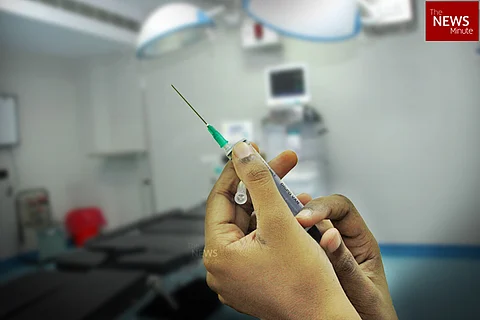

With three children in Kerala dying from rabies within a month, the Health Department is urging the public to trust the vaccination process. Questions and criticism had risen over the quality of the vaccines used in the state after it was revealed that the deceased children had been given vaccines soon after they were bitten by dogs.
Experts say there is no reason to doubt the effectiveness of the vaccine. As such doubts could deter people from taking vaccination, health officials have come out to stress the importance of stopping misinformation. It could cost human lives if timely treatment is not taken, they say.
Dr Aravind Reghukumar, head of the department of Infectious Diseases at the Medical College Hospital in Thiruvananthapuram, said, “It is incorrect to say that the deaths are due to vaccine failure. Death can happen if a virus enters the nervous system before the antibodies from the vaccine could neutralise it.”
Three consecutive deaths
The uproar over the allegedly ‘ineffective’ rabies vaccination grew loud after the death of seven-year-old Niya Faisal on Monday, May 5. The cries of her mother were caught on television cameras, who, between sobs, said that her child was bitten because people were indifferent to the risks of dumping garbage in the neighbourhood, which had drawn the street dogs there. She had repeatedly warned those who did this to stop but no one had listened to her, the mother wailed.
Two children die of rabies in Kerala, families allege medical negligence
It was on April 8 that Niya was bit by a street dog outside her house in Kollam. The mother had followed the protocol, washed her wounds with soap and taken her to a nearby health centre, where the girl was given the first dose of vaccination and immunoglobulin to prevent infection.
Even though the child completed the required four doses of vaccination over two weeks, her health deteriorated and she was taken to the SAT Hospital in Thiruvananthapuram on May 1.
Dr Bindu, the superintendent at SAT, said that Niya had begun to show symptoms of rabies when she was admitted to the pediatric intensive care unit (ICU). “We could not save her. It was a deep wound on her elbow and we suspect that the [rabies] virus had directly entered the nerve. The brain must have been affected before the antibody from the vaccine could have effect,” she said.
Fatal infections often result from deep wounds that cause the virus to invade the nerves before the vaccine takes effect.
The procedures followed are in line with the international guidelines, followed by the Government of India and adopted by Kerala, said doctors, who addressed the media after Niya’s passing.
The other two children who passed away despite taking vaccines after dog bites also had similar deep wounds in areas where nerves run closer to the surface.
Twelve-year-old Bhagyalakshmi from Pathanamthitta died on April 9, nearly four months after she was bit. The incubation period of the virus can go up to two years, experts say.
Bhagyalakshmi too had completed the anti-rabies vaccination from the district hospital.
In the case of six-year-old Ziya Faris, the tragedy occurred on March 29 when she stepped out of her house in Malappuram to buy sweets and got bit on her leg, head, and shoulder. She passed away a month later.
How the rabies virus infects humans
Dr Aravind explained how the virus travels: “The rabies virus enters the brain and the spinal cord through the nerves. That is why it is more dangerous when kids are bit in the neck or hand, where there is high nerve density. Once the nerve is hit, the virus progresses at the speed of 50 to 100 mm a day and reaches the brain and spinal cord. The vaccine will take time to act, that is why we give immunoglobulin to hasten the creation of antibodies.”
“Children are more vulnerable because of their tender skin and the chances of deeper penetration of the wounds. In all these cases, the wounds were deep, which means the virus would have reached the nerves, before the antibody from the vaccine could form,” Dr Viswanathan, surgeon at the Thiruvananthapuram Medical College, told TNM.
Protective mechanisms may be lower for children, which would make them vulnerable to multiple bites. Their short stature also makes it easier for the dogs to attack proximal parts like the neck or head, he said.
Ministers speak
Health Minister Veena George said that all the batches of vaccine and immunoglobulin used in the state were tested and certified at the Central Drugs Laboratory in Kasauli. She said that out of the more than two lakh people who were bitten by animals this year, the number of people who died was a small percentage, which meant that vaccination worked for the others.
Reports say that 13 people have died of rabies in Kerala this year. In the case of the six-year-old child’s death, six others too were bitten, but only she succumbed to the infection.
“In 2022, when we faced a similar situation, an expert committee was formed to study the effectiveness of the vaccine. It was found that more than the required amount of antibodies had developed in everyone tested,” Minister Veena said.
Questions were also raised about the role of the Local Self Government Department (LSGD) in managing stray animals. MB Rajesh, Minister for LSGD, said that it was impractical to follow the Union government recommendation to sterilise all the dogs on the street.
Earlier, Kerala had 900 animal birth control (ABC) centres run by the Kudumbashree, all of which were closed down due to the regulations of the Union government, such as keeping the centres air-conditioned, Rajesh said.
Doctors advise pre-exposure prophylaxis, that is, vaccination before dog bites, in high risk areas and jobs where animals are handled.
Read: Kerala student's death by rabies: How to avoid risk after animal bite